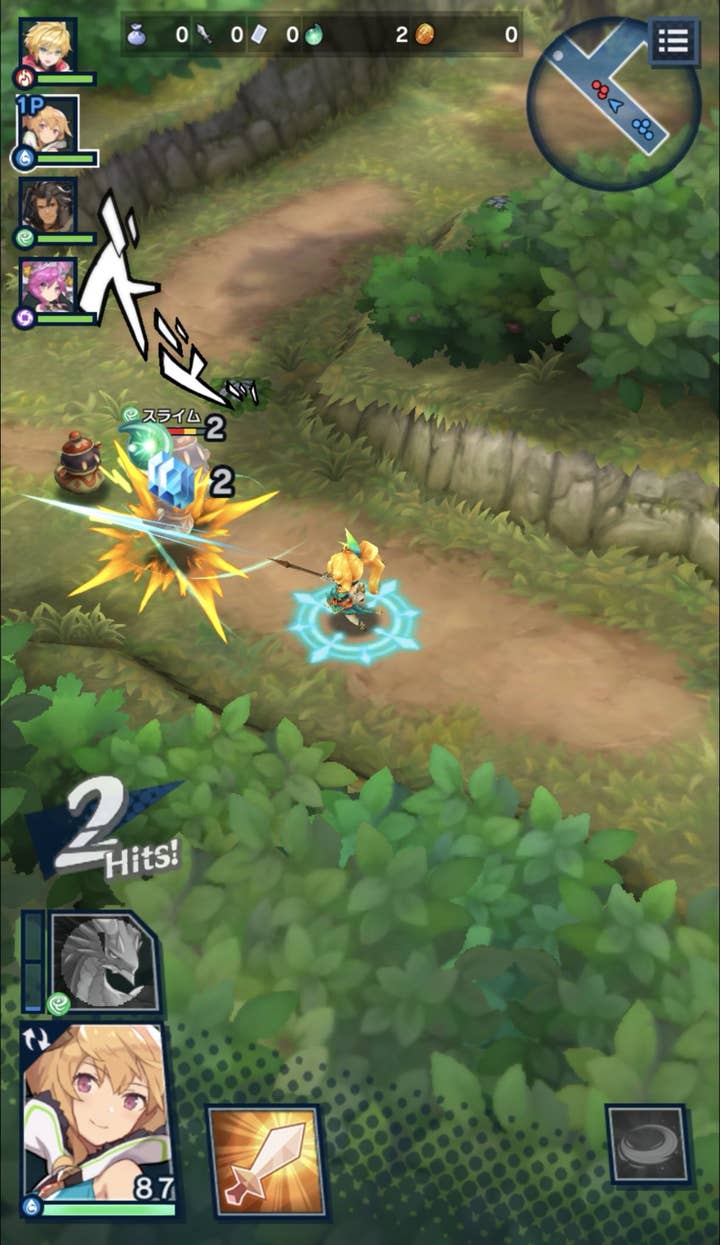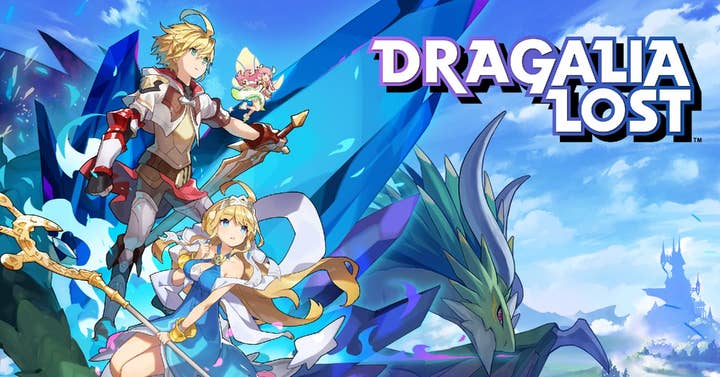Nintendo retreats to arm's length engagement with mobile | Opinion
The shutdown of Nintendo's only original mobile IP, Dragalia Lost, marks a further retreat from the firm's mobile ambitions - with IP licensing being the most likely way forward
This summer, Nintendo will shut down another of its mobile titles: Dragalia Lost, a JRPG-style game that it co-developed with CyGames and launched in late 2018.
Mobile games come and go, and it's not unusual to see even a relatively high-profile title being shut down after a few years if its growth stalls out; but the passing of Dragalia Lost is noteworthy for a number of reasons, not least of which is that it means Nintendo has now shut down two games in the past two years (the previous one being Dr. Mario World) -- a period in which it hasn't launched a single new mobile title.
Far from being a growing part of the company's business, Nintendo's mobile game portfolio is actually shrinking -- the only new Nintendo IP to appear on mobile recently has been Pikmin Bloom, which came about through the company's licensing deal with Pokémon Go creators Niantic.
Dragalia Lost being shuttered is also interesting to some extent because of what the game itself represented: Nintendo's sole foray into creating original mobile IPs, rather than just putting its existing IPs into mobile games. The game was an entirely original creation, with the only aspects of existing Nintendo IP to appear being during crossover events with other games like Fire Emblem Heroes. Nintendo's hand (or rather, its wallet) could instead be seen in the production values of the game, which were remarkably high for a mobile title of this kind.
The success of Switch may have made Nintendo even more risk-averse about reputational issues; the possibility that a mobile side-business could damage the Nintendo brand became less and less palatable
Aside from the obvious value of creating a potential new franchise, the foray into original IP on mobile seemed designed to allow Nintendo to sidestep problems with the medium it had been struggling with -- a mobile-first IP would, in theory, let it experiment and engage with free-to-play game design in ways that it wasn't comfortable doing when its hugely valuable existing IPs were on the line.
Dragalia Lost was far from a flop, at least at first -- it grossed well over $100 million in its first year and was one of the company's best-performing mobile titles at that point. Even if it had stalled fairly badly in the following years, the decision to shut it down -- with nothing on the horizon to replace it in the line-up -- certainly adds fuel to the idea that Nintendo has pretty much lost interest in mobile gaming.
That's a notion that's tempting not least because it certainly contains a nugget of truth. The narrative arc of Nintendo's engagement with the mobile space is easy to follow. The company had for many years been needled and harangued by its investors, both publicly and privately, over its "failure" to capitalise on the mobile gaming boom, so when the Wii U dramatically belly-flopped those investor demands became impossible to ignore.
The mind-blowing success of Pokemon Go was also a major factor; Niantic's game launched in 2016 when the Wii U was pretty much at its lowest ebb and fairly obviously about to be put out of its misery and replaced with a new console, but many investors worried that any new device would just meet the same fate. Pokémon Go had come about as a result of an arm's-length licensing deal with Niantic and unexpectedly became the most successful "Nintendo" product launch in many years; with the firm's hardware platforms struggling, lots of people saw this is a model for how Nintendo could thrive in the future.
So the company built a strategy for turning mobile into a new pillar of the business, and while it's never been entirely clear just how widespread support within the company was for that initiative, at least some people there genuinely took it seriously -- seriously enough to get Mario, and Fire Emblem, and Animal Crossing onto mobile devices, through direct partnerships with mobile specialist firms like DeNA.
But then the fortunes of the company's businesses turned: Switch became an enormous hit, while translating Nintendo's IP to mobile turned out to be a fair bit harder than the overnight success of Pokémon Go had made it seem. With its console business back to rude health, the company's interest in the mobile sector nosedived, which pretty much brings us to the last couple of years -- which have seen no new product launches and existing games being quietly sunset.

That's a straightforward narrative, and honestly, most of it rings true. However, there are two aspects that deserve a little bit of nuance. The first is that Nintendo hasn't lost interest in mobile entirely; rather, it has decided that the best way for it to engage with mobile is through licensing agreements, instead of trying to pivot the company to this form of game-making.
The expansion of the relationship with Niantic to include a license for Pikmin is a good example of this. Thus far it's a slow process, and it's likely to remain such, but it's likely that future mobile engagement from Nintendo will tend towards this kind of model (working with an established and experienced partner by licensing them an IP for a single project), allowing it to retain some degree of engagement with mobile without actually committing the company's efforts in that direction.
It's also worth thinking about what it was that Nintendo actually found so difficult about mobile, to the extent that it seems to have more or less abandoned plans to make the sector into an additional pillar of its business. In this regard, Dragalia Lost's own history is somewhat informative.
The game was lavishly produced for a mobile RPG title, and represented a serious attempt to challenge dominant players in the mobile JRPG category - which is a fairly busy and profitable space, especially in Asia, crowded with very profitable games like GranBlue Fantasy (created by Nintendo's partners on Dragalia Lost, CyGames) and Shironeko Project, and more recently Genshin Impact.
Nintendo embraced some aspects of the mobile landscape in its approach to running this game; it permitted crossovers with other big titles (including its own Fire Emblem Heroes) and monetised the game using a gacha-style approach to unlocking characters. On paper, the idea of this original IP giving some breathing room to Nintendo's mobile strategy seemed to be working.
Pokémon Go had come about as a result of an arm's-length licensing deal with Niantic and unexpectedly became the most successful “Nintendo” product launch in many years
Yet in other regards, I'm not sure Nintendo was ever fully comfortable with the game; despite its early success, it never even launched in quite a few global territories, and its monetisation approach was always curiously-balanced. Dragalia employed standard free-to-play mechanisms that are really designed to pull in revenue from the game's most engaged players, the 'whales' (in other words, systems whereby most players don't pay anything, but a small proportion of the game's biggest fans pay a lot, so the ARPU balances out), but consistently seemed to place fairly low caps on how much you'd ever want or need to spend in the game.
Consequently, most players (myself included, for the six months or so when I played pretty much daily -- it's the only one of Nintendo's mobile titles to hold my attention for long, for what that's worth) never paid a cent, and the 'whales' were more like minnows, also paying relatively little. In some regards that's a very welcome approach, and likely explains why many people enjoyed the game. Dragalia never felt like it had aggressive or disproportionate monetisation -- but this probably meant that revenues dropped off a cliff long before player numbers did, as people realised that almost all characters, items and other aspects of the game were perfectly accessible without paying.
That sums up a lot about the way in which Nintendo was a bad cultural fit with mobile gaming. The company found a great partner in CyGames and worked with them to create a very high quality mobile title (far more slick, I'd argue, than any of CyGames' own titles) -- but that partner is a dab hand at gacha-style monetisation while Nintendo, eternally and often laudably conscious of its image as a family-friendly company, likely drew up a very strict set of red lines about how that could be implemented in their game.
Even in a game that wasn't using any existing Nintendo IP, the risk of the company's name being dragged into headlines about kids (or adults!) racking up credit card bills on gacha mechanisms was undoubtedly one major part of the calculation. The success of Switch may have made Nintendo even more risk-averse about reputational issues; the possibility that a mobile side-business could damage the Nintendo brand became less and less palatable.
That's where we find ourselves now -- and in a sense, the story of Dragalia Lost is a mirror of the story of Nintendo and mobile overall. What made sense in the dark days at the end of the Wii U era has become less and less sensible as the company has regained an industry leadership position with Switch -- and the lessons learned here will probably change Nintendo's attitude to mobile permanently.
The value it places on its brand and IPs just isn't compatible with how the business model for mobile games works right now; that's not a judgement on either side, just a simple statement of incompatibility. As long as that remains the case (which could well be forever, given how unlikely it is for a new business model to overthrow the current paradigm in mobile gaming), Nintendo's engagement with this whole sphere is likely to remain very limited -- and very carefully held at arm's length.

